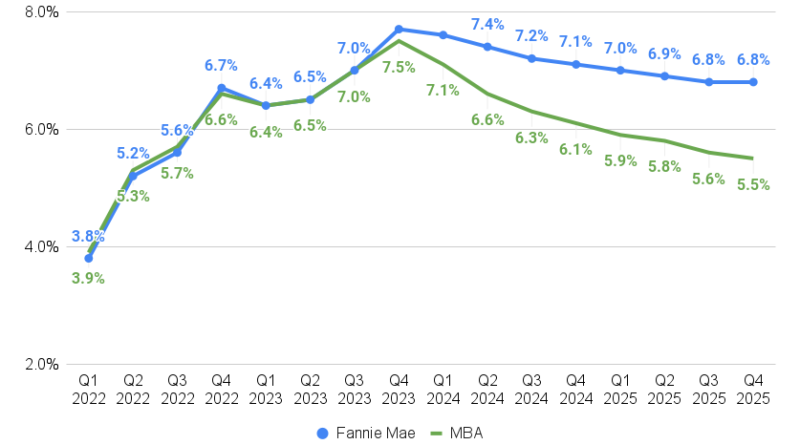Economists Agree Mortgage Charges Have In all probability Peaked, However Will They Come Down?
The decision is in — the previous manner of doing enterprise is over. Be a part of us at Inman Connect New York Jan. 23-25, when collectively we’ll conquer at present’s market challenges and put together for tomorrow’s alternatives. Defy the market and wager massive in your future.
Economists who put collectively two of the true property business’s most intently watched forecasts agree that mortgage charges have most likely peaked, however are sharply divided on how rapidly they’ll come down over the subsequent two years.
Economists at Fannie Mae are taking Federal Reserve policymakers at their phrase that they intend to pursue a “greater for longer” price technique, which might preserve mortgage charges above 7 % subsequent yr.
However forecasters on the Mortgage Bankers Affiliation count on mortgage charges within the mid-6 % vary by the tip of subsequent yr and within the mid-5s by the tip of 2025.
Mortgage price forecasts sharply diverge

Supply: Fannie Mae and MBA forecasts, November 2023.
“Our baseline expectation is that the Fed is not going to increase charges additional this cycle however will preserve coverage tight till it’s clear that inflationary pressures have abated,” forecasters with Fannie Mae’s Financial and Strategic Analysis (ESR) Group mentioned in commentary accompanying their Nov. 21 housing forecast.
Mortgage charges registered their biggest one-day drop in practically 4 years on Nov. 14 after the Bureau of Labor Statistics reported that the all-items Shopper Value Index (CPI) fell to three.2 % in October, down from 3.7 % in September.
Whereas acknowledging that “current volatility on the lengthy finish of the yield curve” provides “extra threat” to their forecast, Fannie Mae economists at the moment are much less optimistic concerning the prospect of decrease charges than they had been in October.
Of their October forecast, Fannie Mae’s ESR Group predicted charges on 30-year fixed-rate mortgages would fall to a median of 6.7 % in the course of the fourth quarter of 2024. Of their newest forecast, which extends into 2025, Fannie Mae economists predict charges will common 7.1 % in This fall 2024, and solely drop beneath 7 % in Q2 2025.
Of their Nov. 17 mortgage finance forecast, MBA economists mentioned they see charges descending extra sharply, to six.1 % by This fall 2024 and 5.5 % by This fall 2025 — a distinction of greater than 1.3 share factors.
“The Fed’s mountaineering cycle is probably going nearing an finish, however whereas Fed officers have indicated that extra price hikes won’t be wanted, price cuts could not come as quickly or proceed as quickly as beforehand anticipated,” MBA Chief Economist Mike Fratantoni said in presenting the commerce group’s 2024 outlook.
However MBA forecasters nonetheless see room for mortgage charges to fall dramatically if the unusually large unfold between Treasury yields and mortgage charges narrows. That’s additionally the view of Lawrence Yun, chief economist for the Nationwide Affiliation of Realtors, who thinks charges on 30-year fixed-rate mortgages might fall to between 6 and seven % by early spring.
The “30-10 unfold” — the distinction between charges on 30-year mounted price mortgages and 10-year Treasurys — has been as high as 3 percentage points this yr, about twice the historic common.
If the unfold had been again to regular, mortgage charges can be round 6.1 % to six.6 % at present, even with out Fed easing, Yun famous in Nov. 14 presentation at NAR’s NXT Convention in Anaheim.
One issue behind the large 30-10 unfold is the elevated prepayment threat at the moment confronted by buyers who purchase mortgage-backed securities that fund most residence loans. Householders who take out mortgages at at present’s comparatively excessive charges are prone to refinance them if mortgage charges come down. However prepayment threat might diminish as soon as charges begin to come down, lowering the 30-10 unfold, in accordance with an analysis by the City Institute’s Laurie Goodman and Michael Neal.
“Whereas charges have been risky, with markets weighing a stew of fixing inflation expectations, heightened Treasury issuance and financial deficits, and international development outlooks, the sharp drop in yields following comfortable October inflation print is noteworthy,” Fannie Mae forecasters acknowledged. “It suggests as soon as bond markets are satisfied that inflation is contained, both by way of a comfortable touchdown or the beginning of a recession, that mortgage charges could have some room to recede, particularly if the at the moment large unfold to the 10-year Treasury price tightens after near-term worries of upper long-run Treasury yields soften.”
Whereas inflation has defied many forecasters’ expectations and made it troublesome to foretell the place mortgage charges may be headed subsequent, MBA and Fannie Mae economists agree that the U.S. might be headed for a gentle recession subsequent yr.
The MBA’s Nov. 17 economic forecast tasks actual gross home product (GDP) will hit -0.4 % in Q1 2024 and -0.5 % in Q2 earlier than rebounding to 0.9 % in Q3. Two consecutive quarters of falling GDP is a broadly used benchmark for a recession.
Fannie Mae economists see a recession hitting just a little later and just a little tougher, with GDP falling to -1.5 % in Q2 and -.5 % in Q3 earlier than rebounding to 0.5 % within the ultimate quarter of the yr.
“Whereas the mix of ongoing employment features and decelerating inflation has elevated the probability of a comfortable touchdown, the ESR group contends that, between a probable slowdown in consumption development stemming from an imbalance between spending and incomes and the rising actual federal funds price weighing on client and enterprise exercise, a downturn stays the almost certainly final result,” Fannie Mae mentioned in announcing its newest forecast.
Projected gross sales of present houses

Supply: Fannie Mae and MBA forecasts, November 2023.
Fannie Mae economists count on gross sales of present houses to say no to a seasonally adjusted annual price of three.9 million houses in the course of the fourth quarter, the bottom tempo of gross sales since 2010, and never backside till Q1 2024.
“Now we have revised our forecast modestly downward largely because of the greater projected rate of interest atmosphere,” Fannie Mae forecasters famous. “Once more, nonetheless, the heightened volatility of long-run rates of interest in current weeks factors to threat across the gross sales projection.”
MBA forecasters suppose gross sales of present houses bottomed in Q3 2023 and are poised for 9 consecutive quarters of development after adjusting for seasonal components.
Get Inman’s Mortgage Brief Newsletter delivered proper to your inbox. A weekly roundup of all the largest information on the earth of mortgages and closings delivered each Wednesday. Click here to subscribe.





